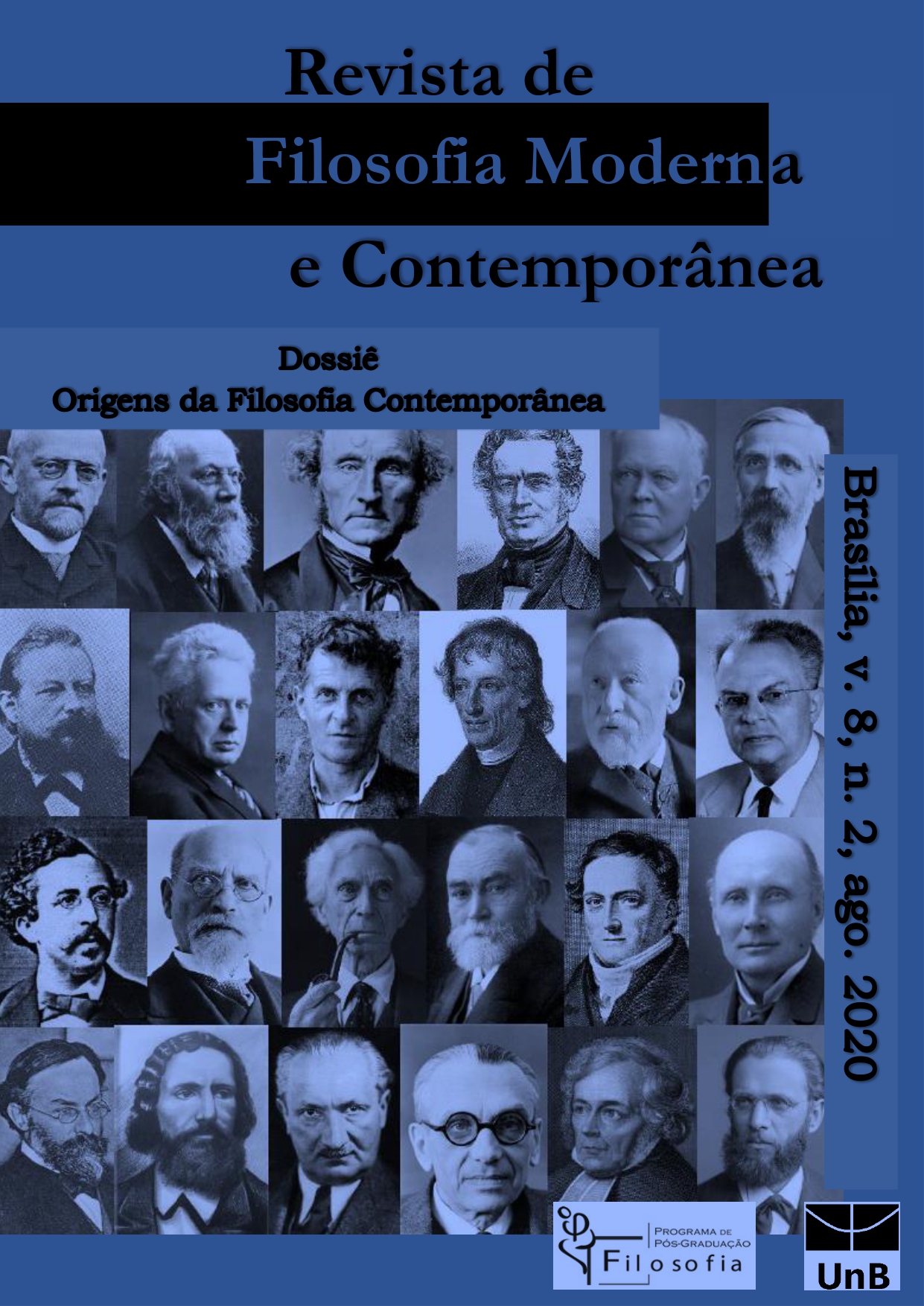Intencionalidade e Compromisso Lógico-Linguístico
Uma crítica a Roderick Chisholm
DOI:
https://doi.org/10.26512/rfmc.v8i2.35865Palavras-chave:
Chisholm. Intencionalidade. Intensionalidade. Atitudes proposicionais. Compromisso lógico-linguístico.Resumo
O objetivo deste artigo é o de analisar e criticar a concepção de intencionalidade de Roderick Chisholm que, historicamente, serviu como ponto de partida para muitas considerações da intencionalidade dentro da filosofia analítica. Minha meta é esclarecer o problemático “compromisso lógico-linguístico” pressuposto por Chisholm, segundo o qual conceitos mentais devem ser interpretados por meio de conceitos semânticos. Depois de abordar a diferenciação de Chisholm entre a tese ontológica (a ideia de que o objeto intencional pode não existir) e a tese psicológica (a concepção de que somente fenômenos mentais são intencionais) bem como o seu critério de definição para intencionalidade (implicação não-existencial, independência ou valor de verdade e referência indireta), me debrucei sobre os diversos problemas apresentados por sua teoria. Primeiro, os dois critérios iniciais acarretam uma confusão conceitual entre o coneito semântico de “intensionalidade” e o conceito mental de “intencionalidade”. Segundo, de acordo com esses critérios ”” e contra a intenção explícita de Chisholm ””percepção e outras atividades cognitivas não devem ser consideradas intencionais. Terceiro, não há fundamentos para a fusão artificial de intencionalidade e o conceito de “atitudes proposicionais””” uma equação que é um princípio explícito do compromisso lógico-linguístico. Em geral, sustento que uma interpretação da intencionalidade baseada nesse compromisso obscurece o verdadeiro significado do conceito de intencionalidade como apresentada, por exemplo, pela fenomenologia.
Downloads
Referências
BRENTANO, Franz. Psychology from an Empirical Standpoint, trans. Antos C.Rancurello, D.B.Terrell and Linda L. McAlister. London: Routledge, 2009.
BYRNE, Alex. “Intentionality”, in S. Sarkar / J. Pfeifer (eds.), The Philosophy of Science. An Encyclopedia. New York / London: Routledge, 2006.
CARNAP, Rudolf. Meaning and Necessity. A Study in Semantics and Modal Logic. Chicago: University of Chicago Press, 1956.
CHISHOLM, Roderick. Intentionality and the Theory of Signs, in Philosophical Studies 3, 1952.
______. Sentences About Believing in Meeting of the Aristotelian Society. London: 1956.
______. Perceiving. A Philosophical Study. Ithaca / London: Cornell University Press, 1957.
______. Believing and Intentionality: A Reply to Mr. Luce and Mr. Sleigh, in Philosophy and Phenomenological Research, Vol. 25, No. 2, 1964.
______. On Some Psychological Concepts and the ‘Logic’ of Intentionality in H.N. Castañeda (ed.), Intentionality, Minds and Perception. Detroit: Wayne State University Press, 1966.
______. Intentionality, in P. Edwards (ed.), The Encyclopedia of Philosophy, Vol. 4 New York / London: Collier ”“ MacMillan, 1967a.
______. Brentano on Descriptive Psychology and the Intentional in E.N. Lee / M. Mandelbaum (eds.), Phenomenology and Existentialism. Baltimore: John Hopkins Press, 1967b.
______. The First Person. An Essay on Reference and Intentionality. Brighton: The Harvester Press, 1981.
______. “My Philosophical Development” in Hahn, L. The Philosophy of Roderick M. Chisholm. Chicago / La Salle: Open Court, 1997.
CORNMAN, James. Intentionality and Intensionality in Philosophical Quarterly 12, 1962.
CRANE, Tim. The Objects of Thought. Oxford: Oxford University Press, 2013.
DENNET, Daniel. The Intentional Stance. Cambridge / London: MIT Press, 1987.
DRETSKE, Fred. The Intentionality of Cognitive States, reprinted in D. Rosenthal (ed.), The Nature of Mind. New York / Oxford: Oxford University Press, 1991.
FODOR, Jerry. Psychosemantics. The Problems of Meaning in the Philosophy of Mind. Cambridge / London: MIT Press, 1987.
HAHN, Lewis E. (ed.). The Philosophy of Roderick M. Chisholm. Chicago / La Salle: Open Court, 1997.
HARNEY, Maurita. Intentionality, Sense and the Mind. Dordrecht: Springer, 1984.
KENNY, Anthony. Action, Emotion and Will. London / Henley: Routledge & Kegan Paul, 1963.
KIM, Jaegwon. Chisholm on Intentionality: De Se, De Re, and De Dicto”, in Hahn, L. .). The Philosophy of Roderick M. Chisholm. Chicago / La Salle: Open Court, 1997.
______2003. Chisholm’s Legacy on Intentionality in Metaphilosophy, Vol. 34, No. 5, 2003.
KRIEGEL, Uriah 2011, The Sources of Intentionality (New York: Oxford University Press, 2011).
MARRAS, Ausonio. Intentionality, Mind and Language. Urbana / Chicago / London: University of Illinois Press, 1972.
MOHANTY, Jitendra N. The Concept of Intentionality. St. Louis: Warren H. Green, 1972.
MONTAGUE, Michelle. Against Propositionalism in Noûs, 41:3, 2007.
QUINE, Willard O. Word and Object. Cambridge: The MIT Press, 1960.
RUSSELL, Bertrand. The Philosophy of Logical Atomism, reprinted in his Logic and Knowledge. Nottingham: Spokesman, 2007.
______.The Analysis of Mind. Mineola: Dover Publications Inc., 2005.
SANFORD, David H. Chisholm on Brentano’s Thesis, in, Hahn L. The Philosophy of Roderick M. Chisholm. Chicago / La Salle: Open Court, 1997
SEARLE, John 1983, Intentionality. An Essay in the Philosophy of Mind. Cambridge: Cambridge University Press, 1983.
URMSON, James O. COHEN, Jonathan. Criteria of Intensionality in Proceedings of the Aristotelian Society, Supplementary Vol. 42, 1968.
Downloads
Publicado
Como Citar
Edição
Seção
Licença
Copyright (c) 2020 Revista de Filosofia Moderna e Contemporânea

Este trabalho está licenciado sob uma licença Creative Commons Attribution-NonCommercial-NoDerivatives 4.0 International License.
Direitos Autorais para artigos publicados nesta revista são do autor, com direitos da primeira publicação para a revista. Em virtude dos artigos aparecerem nesta revista de acesso público, os artigos são de uso gratuito, com atribuições próprias, em aplicações educacionais e não-comerciais.


